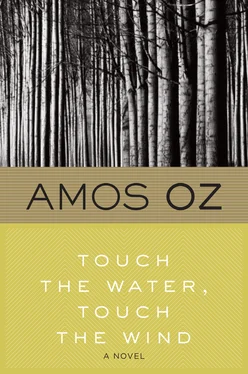Amos Oz - Touch the Water, Touch the Wind
Здесь есть возможность читать онлайн «Amos Oz - Touch the Water, Touch the Wind» весь текст электронной книги совершенно бесплатно (целиком полную версию без сокращений). В некоторых случаях можно слушать аудио, скачать через торрент в формате fb2 и присутствует краткое содержание. Год выпуска: 1991, Издательство: Mariner Books, Жанр: Современная проза, на английском языке. Описание произведения, (предисловие) а так же отзывы посетителей доступны на портале библиотеки ЛибКат.
- Название:Touch the Water, Touch the Wind
- Автор:
- Издательство:Mariner Books
- Жанр:
- Год:1991
- ISBN:нет данных
- Рейтинг книги:5 / 5. Голосов: 1
-
Избранное:Добавить в избранное
- Отзывы:
-
Ваша оценка:
- 100
- 1
- 2
- 3
- 4
- 5
Touch the Water, Touch the Wind: краткое содержание, описание и аннотация
Предлагаем к чтению аннотацию, описание, краткое содержание или предисловие (зависит от того, что написал сам автор книги «Touch the Water, Touch the Wind»). Если вы не нашли необходимую информацию о книге — напишите в комментариях, мы постараемся отыскать её.
1939. As the Nazis advance into Poland, a Jewish mathematician and watchmaker named Pomeranz escapes into the wintry forest, leaving behind his beautiful, intelligent wife, Stefa. After the war, having evaded the concentration camps, they begin to build new lives, Stefa in Stalin’s Russia and Pomeranz in Israel, where, as they move toward reunion, another war is brewing. An intricate tale of people seeking escape from a hostile world in thrillingly fantastical ways.
Touch the Water, Touch the Wind — читать онлайн бесплатно полную книгу (весь текст) целиком
Ниже представлен текст книги, разбитый по страницам. Система сохранения места последней прочитанной страницы, позволяет с удобством читать онлайн бесплатно книгу «Touch the Water, Touch the Wind», без необходимости каждый раз заново искать на чём Вы остановились. Поставьте закладку, и сможете в любой момент перейти на страницу, на которой закончили чтение.
Интервал:
Закладка:
Panting. Her silence. And his.
The widening gap between their silences.
And, after a few moments, the words again.
Audrey to Pomeranz:
National Liberation. International Liberation. Inner Liberation. What do you think. My generation, your generation. And also: Liberation of the body. Liberation from the restraints of the body. The other reality. Liberation through violence. All war is dereliction. The meaning of unfulfilled longing. The natural right to universal gratification. And also: Revolutionizing the Revolution. The Jew as a symbol. Revitalizing decay, uninvolved vitality. And also: Consistency, the modern neurosis. Drugs, a simple remedy. The purifying vigor stored up in the black race. Reason is a cancer. Reality, Audrey said, is a petit-bourgeois escape. The final revolution, Audrey said, will be a fantasy of sounds, an orgy of colors, the abolition of death.
Pomeranz casually pardoned these venial sins. He bent over her simple innocence, forced an entrance, plunged his red-hot loneliness into her. In between desperate pants he in turn began preaching to Audrey: The absurdity of gravity. The potency of high notes. Bugles. A Polish kingdom in the Aegean Islands. Music, which is audible mathematics.
And also: Sewing-machine parts. The branch of a chestnut tree which grew into the back of the bronze statue of Slowacki in Sobieski Square. Swiss promissory notes. The silence of the forest and the borderline between it and the silence of the low sky in winter. Village sorceresses, Przywolski the Last, Mieczyslaw the First, anointed in exile with sewing-machine oil. The Princess Magda Isawolska, the Virgin Whore. Her sin and absolution. And also: Vampires. Thoughts like radar beams. And again: Music, the mysterious link between magnetism and electricity. As opposed to physical relations, the clumsy ephemeral convergence of abstract energies.
And finally: Vikings. Nibelungs. Pork fat.
As against: The song of the stars. Release from the body. Levitation. The power of love. The potency of grace.
In brief, what was there in common. He with his. She with hers. Another night, another day, perhaps another night. Not a line had she sketched here, but she had had an Experience. Now she would be on her way. 'Bye. And he lay back, astounded.
But he found no rest.
16
A new character knocked on the door.
A short, brisk middle-aged man, with remarkably short fingers, one eye smaller than the other, and his ears straining forward. Like a rabbi who for years has been secretly committing adultery. He was accompanied by three tall, handsome young men who all looked alike and collectively resembled the familiar representation of a young pioneer. Throughout the visit they displayed an extreme deference toward the senior visitor: they sat when he sat, stood when he stood, and were silent when he spoke. He was calling on behalf of the Central Intelligence Bureau. He had one or two questions to put and then he would be off: God Almighty preserve us from the sin of wasting other people's valuable time. Tiberias, incidentally, seemed to him to be losing its charm: all housing developments and eucalyptus trees. So sad. The lake, on the other hand, was a thing of beauty and a joy forever. After all, it was, up to a point, a historic lake. No, no tea, thank you, I am on duty, and I wish to cause you the minimum possible inconvenience. The boys won't have any, either: they're such magnificent lads, content with so little, almost spiritual, up to a point. Incidentally, a single man's lot is not a happy one. A married couple can offer each other mutual assistance, but a single man has no one to help him. There's a story told of Rabbi Levi Yitzhak of Berdichev which illustrates this perfectly — but there, we haven't come here to tell anecdotes, only to put one or two questions and then be off. I myself am, up to a point, a single man too, but that is a horse of a different color, and we must stick to the matter in hand. To return to the point, then. A single man must guard, above all else, against wallowing in self-pity. Self-pity is our worst enemy. The topic can be reinforced by a trivial example from my own professional work. For some time now we have been put to enormous trouble investigating a certain foreign agent, an elusive, cunning, Communist, dangerous Infidel by the name of Stravinsky, alias Davidson, alias the Siberian, alias Father Nicodeme. Well, to cut a long story short, whatever his real name, this agent is apparently the center of a number of radiating spokes. A kind of outspread net, in other words. It is a flattering state of affairs, is it not, if we adopt a certain point of view. At the risk of exaggerating, one might almost say a source of natural, justifiable pride, that we excite their curiosity to such an extent. That they honor us by sending us a secret agent of the first water, so to speak, a real expert, a virtuoso soloist, if I may borrow a metaphor from the realm of the arts to serve our own, which is that of vulgar melodrama. In other words, they already regard us as worthy of their serious attention. Into a pail you don't throw a whale, to coin a phrase. But that is not the crux of the topic, which is this: assuming that we are not — heaven forbid — following a false trail, it would appear that this Stravinsky is taking a close interest in a certain Pomeranz. Both the problem and its solution, as the Talmud so often teaches us, are contained in the same text. However our opinions may be divided on some matters, such as prophetic justice or life after death, in this case all five of us are bound to agree at once and beyond all shadow of doubt that a small question, a natural question, arises here: why should the aforementioned Father Nicodeme take such a lively interest in a mere master watchmaker from Tiberias? What is this, a comedy? Some kind of a joke? Why should a Russian spy of the highest rank keep his beady eye on a very excellent watchmaker from Tiberias? Come, let us leave aside the practical aspect for a moment; after all, we are not half-witted blinkered bureaucrats out of a story by Gogol. Let us contemplate the topic from a broad theoretical standpoint. On a purely theoretical plane, the interest shown by this so-called Siberian in a man like yourself is a phenomenon calling for concentration and a penetrating mind. It excites the curiosity, like a game of chess, if we may be permitted the allusion in present company. In other words, a man's private life is his own affair. Da. Very well. But perhaps, nevertheless, something did happen to you in Europe? Europe is, in a sense, a very important continent for us. Words of mine can hardly do justice to the importance of Europe. Alors, my dear sir, do try to remember. Make an effort. Please. You were in Vienna, were you not? And in Athens. You spent some time in Piraeus. You must have seen some splendid sights. You are a man of the world, as they say. Well? No, wait, excuse me, why the haste? Don't be in too much of a hurry to answer. Such matters merit leisurely reflection, concentration, perhaps a certain amount of caution; they should be regarded as rather delicate matters. What is more, the climate is decidedly hot today. Why don't we relax for a moment, forget about these burning issues, and exchange stories and anecdotes. Why was it that at the beginning of February you decided to purchase a map of the roads and settlements? After all, you are not, if one may say so, a geographer, but a mathematical personality, up to a point. Mathematics, incidentally, is, to my mind, a sublime and precious member of the family of the sciences, if a mere simpleton may be permitted to express a personal opinion. And Fedoseyeva, my dear sir, what does the name Fedoseyeva mean to you? Yes, indeed, it is a Russian name. Distinctly Russian. After all, we are all of us Russian — unless of course we happen to be Polish. By the way, you studied under Professor Emanuel Zaicek, a fascinating personality, not only in the field of philosophy but also in the dissemination of new ideas. After all, we now know beyond all shadow of doubt, we have examined, tested, and proved, we have tirelessly fitted one detail to another, we know that you hail from the same town originally as a certain member of the Cabinet. So many fine threads come together to weave a broad, fascinating fabric. You come from the same town as one of our Cabinet ministers, you are a pupil of a brilliant professor, you are the darling of a Communist agent of the first water, and to cap it all you are also a mathematical celebrity, who out of an excess of modesty has chosen to setde in a remote country town and repair tiny watches-only a fool would underestimate all these various advantages. Da. To the heat we might eventually manage to get acclimatized, but this humidity turns every human being into a running fountain of perspiration. And what of the tourist girl? Was it pure chance that brought her here-to Israel of all countries, to Galilee of all regions, to Tiberias of all towns, to this house of all possible places? Wasn't she on a mission? Or was there no ulterior purpose, simply divine guidance? Was this same young lady not recently the girl friend of a black radical leader in New York, which is a gigantic city in the full sense of the word? Well, we must not meddle in affairs of the heart, nyet, never, as a matter of principle. The young lady stayed with you, and that's that. This is a matter of the emotions, up to a point, of physical attraction, love, et cetera; we are not experts in this field, and we lack the professional qualifications to deal with such a subject. On the contrary. To come back to the matter in hand. It would be rather exciting, even somewhat nostalgic, if you would be kind enough — for the purpose of purely theoretical comparison — to show us your old passport. From those days. No, do you take us for imbeciles, we do not of course desire to see a genuine passport; we are not so indiscreet. Look here, I'll let you into a confidence, just between ourselves and absolutely off the record: even a forged passport is enough to excite men of our profession. We are modest in our demands, my dear Przywolski, we represent a poor nation, no one supports us with training and funds, like the Goethe Society or your clever gang in Piraeus. By the way, can any Jew worthy of the name lay claim to a genuine passport? In those days even we ourselves were not above stealing across a little border or two here and there with the assistance of forged papers. After all, those were days of troubles and incomplete security, as we both know so well. These charming young men, on the other hand, who are such a feast for the eyes, what do they know, what can they understand of those days? I pride myself on the love of literature, the love of knowledge which I have implanted in their breasts. That is why they are now leafing through your notebooks and papers — without, heaven forbid, creating any disorder — and if you have no objection perhaps they might also peep into your desk drawers. With your kind permission, of course. Nature reigns supreme on mountain, vale, and stream. Let's go back to those old days. At that time twilight offered almost the only hope. Provided you had documents drawn up by a loving and also professional hand. Coincidentally, Father Nicodeme, with whom we began our little conversation, and whose attention you have attracted to yourself, is also suspected of having Polish origins. And again, to pile coincidence on coincidence, you were not born to be a watchmaker, were you? A horse pulls a cart, and doesn't try to be too smart. Just between ourselves, my dear sir, you are a scientist, are you not, a scholar, a maker of discoveries. We unearthed a brilliant piece of work by you in Kulturny for March, 1938, about time, gravity, and magnetic fields, work which I am informed represents a small step beyond Einstein, and now we suddenly find you tinkering with clocks and watches. How come, I ask myself. And you yourself admitted ten minutes ago that you are secretly engaged in various kinds of researches or studies, and experiments, would you agree that curiosity naturally burns within us like a strong flame, how could you bear to abandon your wife to the mercy of the Germans and make your escape alone, and why did you pick on a quiet remote spot like Tiberias, of all places, such an innocent spot, and where did you get hold of the money you brought with you, and why watches, and who sent the young American lady to you, and what is the connection between you and Fedoseyeva, why is Father Nicodeme so eager to know your movements, and who-if I may be permitted to intrude into your more intimate affairs — who was it who financed the Goethe Society in the town of M — in the days of the Polish Republic, and what was behind the respectable façade of that philosophical society, that is to say, who gave Professor Zaicek his orders, and who in turn gave you yours? And who else from that group, apart from yourself and the Cabinet minister I have mentioned, has succeeded in reaching this country, and all in all — I ask myself in amazement, in exasperation almost — how does it come about that a brilliant Jewish scientist, physicist, and researcher such as yourself suddenly and simply leaves German-occupied Poland, just like that, as if it were nothing, as if you could build a wall out of nothing at all, to coin a phrase. The whole business gives us no rest, as you can understand, it has all been checked and supported by documents, photographs, and fingerprints, and we have several options open to us if we decide to examine you closely. A Jew sets out one fine day, leaves occupied Poland just like that, and flits backward and forward between Vienna and Budapest, Bucharest and Piraeus, instead of heading straight for his homeland, and he a scientist, who must have a few juicy tidbits about him, and then he shuts himself away up here like a paragon of modesty and self-effacement, how does it come about, I ask myself, and for how much longer. So you see, Fedoseyev, questions, questions, and still more questions, and I have already told you that these beautiful young men are simply mad about literature: they would sacrifice their own mothers for the sake of a good story. So if the four of us meet with your approval, let's all smoke a cigarette together, and why don't you, of your own free will, tell them a nice appetizing story? Admittedly you are addressing a very limited audience. One might even say an intimate audience. A drawing-room audience. On the other hand, it is a hand-picked audience. Even I, who am no artist, receive their wholehearted attention. By the way, before we hear the story, we should very much like to know the author's name, so that we can give credit where credit is due. What is your name, Pomeranz?
Читать дальшеИнтервал:
Закладка:
Похожие книги на «Touch the Water, Touch the Wind»
Представляем Вашему вниманию похожие книги на «Touch the Water, Touch the Wind» списком для выбора. Мы отобрали схожую по названию и смыслу литературу в надежде предоставить читателям больше вариантов отыскать новые, интересные, ещё непрочитанные произведения.
Обсуждение, отзывы о книге «Touch the Water, Touch the Wind» и просто собственные мнения читателей. Оставьте ваши комментарии, напишите, что Вы думаете о произведении, его смысле или главных героях. Укажите что конкретно понравилось, а что нет, и почему Вы так считаете.

![Хироми Каваками - Strange Weather in Tokyo [= The Briefcase]](/books/29150/hiromi-kavakami-strange-weather-in-tokyo-the-br-thumb.webp)










